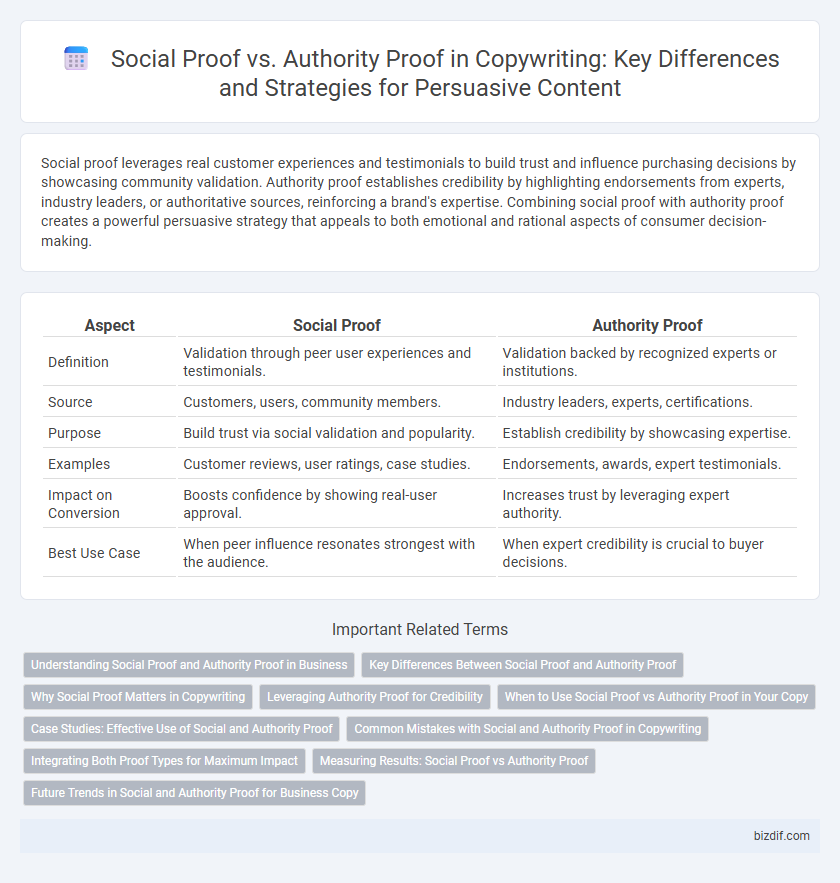Social proof leverages real customer experiences and testimonials to build trust and influence purchasing decisions by showcasing community validation. Authority proof establishes credibility by highlighting endorsements from experts, industry leaders, or authoritative sources, reinforcing a brand's expertise. Combining social proof with authority proof creates a powerful persuasive strategy that appeals to both emotional and rational aspects of consumer decision-making.
Table of Comparison
| Aspect | Social Proof | Authority Proof |
|---|---|---|
| Definition | Validation through peer user experiences and testimonials. | Validation backed by recognized experts or institutions. |
| Source | Customers, users, community members. | Industry leaders, experts, certifications. |
| Purpose | Build trust via social validation and popularity. | Establish credibility by showcasing expertise. |
| Examples | Customer reviews, user ratings, case studies. | Endorsements, awards, expert testimonials. |
| Impact on Conversion | Boosts confidence by showing real-user approval. | Increases trust by leveraging expert authority. |
| Best Use Case | When peer influence resonates strongest with the audience. | When expert credibility is crucial to buyer decisions. |
Understanding Social Proof and Authority Proof in Business
Social proof leverages customer testimonials, reviews, and user-generated content to build trust by showcasing the experiences of peers, while authority proof relies on endorsements from industry experts, certifications, or recognized brands to establish credibility. Both strategies enhance conversion rates by addressing different psychological triggers: social proof appeals to conformity and community validation, whereas authority proof reinforces expertise and reliability. Effective business copywriting integrates these elements to create a balanced narrative that increases consumer confidence and drives purchasing decisions.
Key Differences Between Social Proof and Authority Proof
Social proof relies on the influence of peers and customer testimonials to build trust and validate a product or service, often through reviews, ratings, or user-generated content. Authority proof, on the other hand, leverages endorsements from experts, industry leaders, or official credentials to establish credibility and expertise. Key differences include the source of influence--crowd consensus versus recognized authority--and the psychological impact, where social proof appeals to conformity while authority proof appeals to trust in expertise.
Why Social Proof Matters in Copywriting
Social proof matters in copywriting because it leverages real user experiences and testimonials to build trust and credibility, making potential customers more likely to convert. Unlike authority proof, which relies on expert endorsements or brand power, social proof taps into the psychological principle of herd behavior, showing that others have validated the product or service. Highlighting positive reviews, customer success stories, and user-generated content increases authenticity and engagement in marketing messages.
Leveraging Authority Proof for Credibility
Leveraging authority proof enhances credibility by showcasing endorsements from trusted experts, industry leaders, or reputable institutions, which significantly influences buyer trust and decision-making. Unlike social proof, which relies on customer testimonials and peer reviews, authority proof establishes a higher level of expertise and reliability that reassures potential clients about the quality and authenticity of a product or service. Incorporating authoritative logos, certifications, and expert quotes in copywriting strategically builds confidence and drives conversions through perceived legitimacy.
When to Use Social Proof vs Authority Proof in Your Copy
Use social proof in your copy when aiming to build trust through relatable customer experiences, such as reviews, testimonials, or user-generated content that highlight peer validation. Authority proof is more effective when establishing credibility and expertise, leveraging endorsements from industry experts, certifications, or official awards to instill confidence in your brand. Tailor your choice based on the target audience's familiarity with your product and the type of validation they find most persuasive.
Case Studies: Effective Use of Social and Authority Proof
Case studies leverage social proof by showcasing real customer experiences and measurable results, reinforcing trust and relatability among potential clients. Authority proof is established through expert endorsements, certifications, and industry recognition within case studies, enhancing credibility and perceived expertise. Combining both proofs in case studies creates a compelling narrative that drives conversion by validating claims with authentic, authoritative evidence.
Common Mistakes with Social and Authority Proof in Copywriting
Common mistakes with social proof in copywriting include relying on generic testimonials that lack specificity and failing to verify the credibility of user reviews, which diminishes trust. Authority proof errors often involve overstating endorsements or using unverified expert opinions, leading to skepticism from the audience. Effective copywriting combines authentic social proof with validated authority endorsements to build genuine credibility and increase conversion rates.
Integrating Both Proof Types for Maximum Impact
Integrating social proof and authority proof enhances credibility by combining user testimonials with expert endorsements, increasing trust and conversion rates. Social proof leverages real experiences from satisfied customers, while authority proof relies on recognized industry figures or certifications to validate claims. Merging these proof types creates a powerful, persuasive message that appeals emotionally and rationally to potential clients.
Measuring Results: Social Proof vs Authority Proof
Measuring results in social proof involves tracking metrics like customer reviews, ratings, and referral conversions to gauge trust and influence. Authority proof effectiveness is evaluated through endorsements from industry experts, credentials, and media mentions that enhance brand credibility. Analyzing engagement rates and conversion uplift helps determine which proof type drives higher trust and sales within target audiences.
Future Trends in Social and Authority Proof for Business Copy
Future trends in social proof emphasize leveraging AI-driven influencers and real-time customer feedback to enhance authenticity and engagement. Authority proof is evolving through expert validation via blockchain technology, ensuring credibility and transparency in business copy. Combining these advancements will elevate trust and conversion rates by seamlessly integrating verified endorsements and dynamic social interactions.
Social Proof vs Authority Proof Infographic

 bizdif.com
bizdif.com